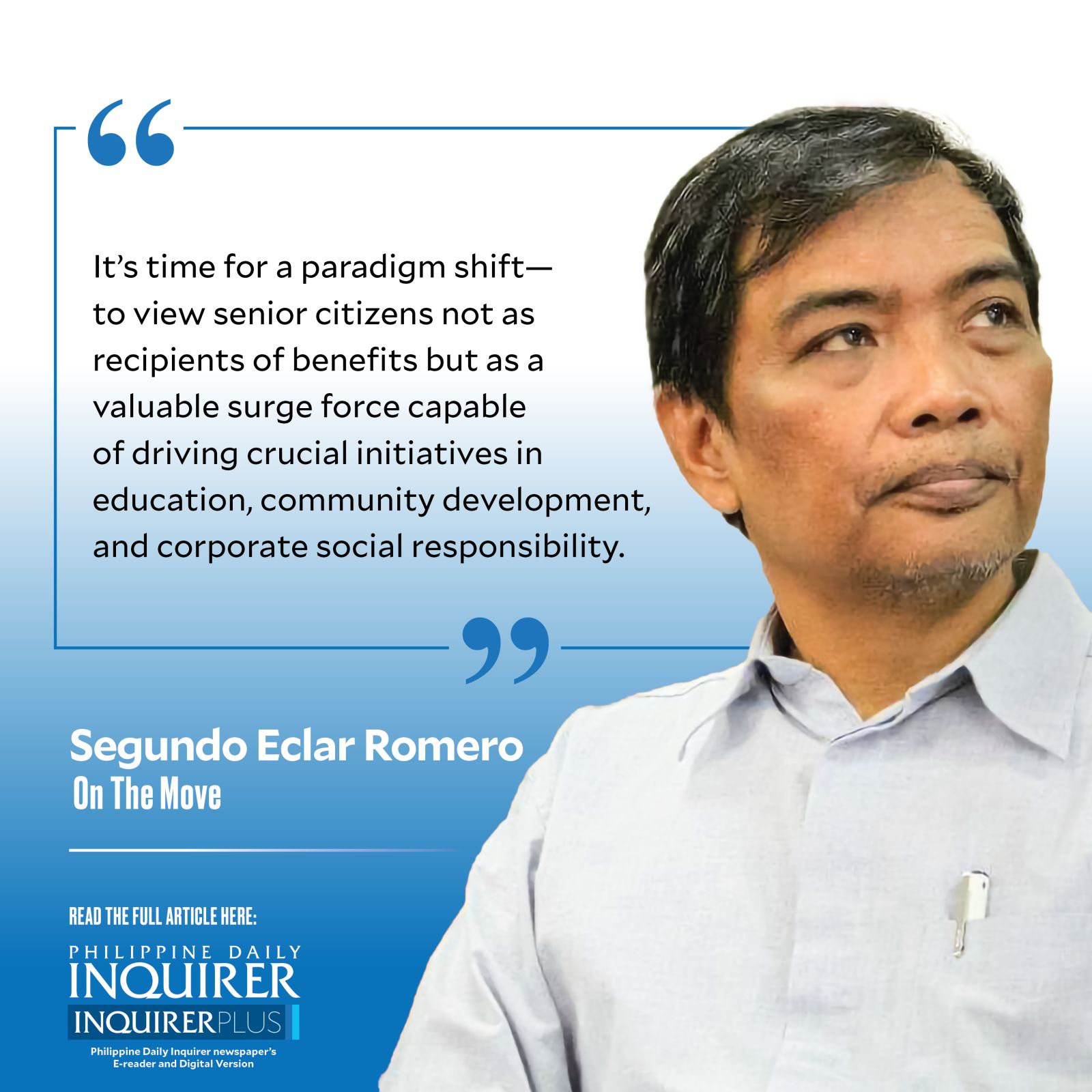Repurposing senior citizens for national development

Last week, I was invited to run a whole-day workshop for the Department of Education’s (DepEd) External Partnership Service on the topic, “Convergent Strategic Pathways for Inclusive Local Community Education in the Philippines” in Cebu City. The participants were some 70 DepEd external partnership focal persons from all the regions. It was a rich learning experience for me about the diverse and daunting challenges of striking and sustaining partnerships across local and foreign government, business, and civil society organizations in the service of Philippine education. This engagement made me think of the elephant in the room in many a discussion about developmental multipliers and surge forces—senior citizens as external partners.
In many societies, senior citizens are often perceived through a lens of vulnerability, leading to policies that provide them with special privileges such as discounts on essential goods and services. While these measures acknowledge their contributions to society, they inadvertently pigeonhole senior citizens into a passive role, overlooking the wealth of experience, skills, and potential they possess.
The advances in health and medicine have extended the average lifespan for Filipinos, which, at 72 is 12 years beyond retirement age. Seniors present a poorly tapped highly skilled and experienced demographic. In the Philippines, where literacy and educational challenges are alarming, senior citizens, particularly those from the education sector, can play a pivotal role. Partnering with government, business, and civil society organizations, retired teachers, education supervisors, and superintendents can contribute to alternative learning systems for out-of-school youth and illiterate adults.
Article continues after this advertisementSpeaking more broadly, senior citizens possess a reservoir of skills vital for community development. Many cooperative ventures in developing countries face challenges due to a lack of experience and training in essential areas like financial management, which might be at the heart of the reluctance of target beneficiaries like jeepney drivers and operators to consolidate their livelihoods into cooperatives. Retired professionals can bridge these gaps, providing expertise in financial, accounting, logistics, marketing, and organizational management to ensure the success of developmental initiatives among the urban and rural poor.
Taking a cue from developed nations like Australia and Germany, where repurposing senior citizens is a well-established practice, the Philippines can create similar structures. Germany’s Senior Experten Service, for instance, showcases the potential of utilizing senior citizens’ expertise in disaster risk reduction, water systems development, agriculture, and more.
Corporate social responsibility (CSR) initiatives also stand to benefit from repurposing senior citizens. Many companies are eager to enhance their CSR programs but lack a clear strategy. Harnessing the skills and experience of senior citizens can enhance the design and feasibility of CSR initiatives.
Article continues after this advertisementSeveral laws in the Philippines advocate for the welfare of senior citizens like Republic Act No. 9994 or the Expanded Senior Citizens Act of 2010. We need to redirect attention toward how they can actively contribute to local community development. Developing a comprehensive strategy involves not just creating opportunities but also building the capabilities and providing necessary resources.
It’s time for a paradigm shift—to view senior citizens not as recipients of benefits but as a valuable surge force capable of driving crucial initiatives in education, community development, and corporate social responsibility. The proposed senior citizens center in all cities and municipalities must be more a platform for serving the community than Zumba exertions and swapping gerontologic health tips.
A strategy for repurposing senior citizens for national and local development entails specific systems: how retired experts will be identified, engaged, and deployed for various projects; how to identify the priority areas where retired experts can contribute; how to create interoperability between the regular, organic staff and the retired experts; how to design projects with retired expert inputs for the greatest chance of success; how to assess the impact of senior expert service interventions; and how to remunerate or support the retired experts.
The financial constraints in providing remuneration, allowances, and support for retired professionals can pose a significant hurdle. Disparities in compensation between the public and private sectors, inconsistent policies, and limited benefits may deter potential contributors. Standardized guidelines, clear policies, and collaborative efforts between government agencies, private sectors, and nongovernmental organizations are essential to address these challenges and establish a supportive environment.
Repurposing senior citizens requires a concerted effort from the government, civil society, and private sector to recognize and unlock the untapped potential of this valuable demographic. By doing so, we not only enrich the lives of senior citizens but also pave the way for a more sustainable and inclusive future.
doyromero@gmail.com
















